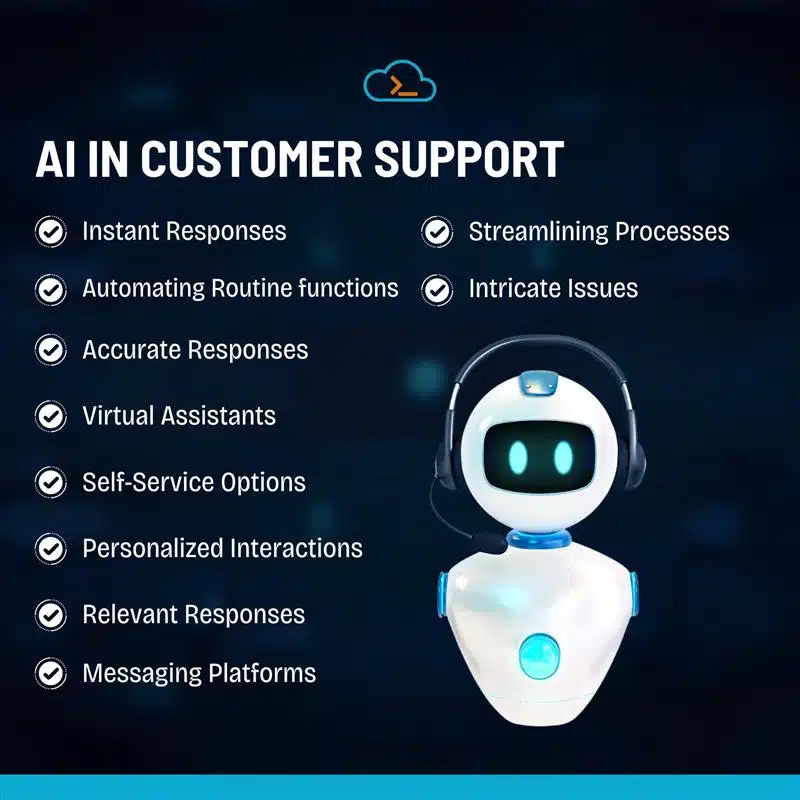Natural Language Processing (NLP): AI chatbots use NLP to understand and interpret human language. They can process text and voice input and generate appropriate responses.
Machine Learning (ML): Automated learning algorithms enable AI chatbots to enhance their performance by learning from interactions and continuously improving their responses over time. They can adapt to different customer inquiries and provide more accurate and timely responses.
AI chatbots are designed to simulate human-like interactions, making it easier for users to obtain information or assistance through conversational interfaces. Dive into the blog to learn more about how AI chatbots are transforming business-customer interactions.
Key Takeaways
- By automating routine tasks, providing instant responses, and personalizing interactions, AI chatbots are significantly enhancing the customer experience.
- AI chatbots offer numerous benefits for businesses, including reduced operational costs, improved efficiency, increased customer satisfaction, and valuable insights into customer behavior.
- Implementing AI chatbots requires careful consideration, such as data privacy, ethical considerations, and technical limitations, to ensure successful integration and positive customer experiences.
Significant Areas Of Impact
- Customer Data: AI chatbots can sift through extensive customer data to detect patterns, preferences, and problem areas. This information can be used to tailor multilingual support team interactions and improve product offerings.
- Customer Queries: AI chatbots can handle a wide range of customer issues, from simple questions to complex issues. By automating routine tasks, they free up human agents to focus on more complex problems.
- Customer Feedback: AI chatbots can gather and assess customer feedback to pinpoint opportunities for enhancement. It helps businesses continuously enhance their products and services.
Our SaaS Product Marketing Agency specializes in marketing teams that use tailored data-driven strategies to drive growth and increase visibility for software-as-a-service companies.
AI In Customer Support
The integration of artificial intelligence chatbots into customer support workflows offers numerous benefits that can significantly enhance the overall customer experience.
- Instant Responses: AI-powered chatbots can provide instant responses to customer issues, reducing wait times and improving customer satisfaction.
- Automating Routine functions: AI chatbots can automate repetitive and managing password resets, thus allowing human agents to handle more intricate problems.
- Accurate Responses: AI chatbots can provide accurate and consistent responses to customer doubts, reducing the risk of errors and improving customer confidence.
- Virtual Assistants: AI chatbots can act as digital assistants, guiding customers through the sales pipeline and providing personalized recommendations.
- Self-Service Options: AI chatbots can provide self-service features, enabling customers to resolve their inquiries independently without needing human assistance.
- Personalized Interactions: AI chatbots can personalize customer engagement based on their preferences and history, providing a more relevant and engaging experience.
- Relevant Responses: AI chatbots can provide relevant responses to customer concerns by analyzing their context and understanding their intent.
- Messaging platforms: AI chatbots can be integrated with popular messaging platforms, making it easier for customers to access support.
- Streamlining Processes: AI chatbots can streamline support processes, reducing costs and improving efficiency.
- Intricate Issues: While AI chatbots can handle many repetitive customer queries, they may still require human input for intricate issues or sensitive topics.
Partnering with our Enterprise SEO Agency ensures that your business achieves sustainable growth and top-tier search engine visibility across competitive markets.

AI In Live Chat And Customer Support
AI has had a profound impact on live chat and customer support teams, transforming how businesses engage with their customers. Some of the key impacts include:
- Round-the-Clock Support: AI chatbots offer 24/7 support, guaranteeing that customers have constant access to help whenever they need it.
- Assist Customers: AI chatbots can help customers with a range of tasks, including placing orders, tracking deliveries, and resolving issues.
- Proactive Support: AI chatbots can proactively contact customers with relevant information or offers, improving customer engagement and loyalty.
- Business Leaders: AI chatbots can provide valuable insights to corporate leaders, helping them to identify trends, improve customer satisfaction, and optimize operations.
- Human Intervention: While AI-powered chatbots can handle many customer interactions, human agents may still be required to handle complex issues or sensitive topics.
- Proactive Messages: AI chatbots send customers messages such as order confirmations, shipping updates, and personalized recommendations.
- Multiple Customers: AI chatbots can handle various customers simultaneously, improving efficiency and reducing wait times.
- Operational Costs: AI chatbots can help reduce operating expenses by automating tasks and improving efficiency.
As the Best Digital Marketing Agency, we deliver innovative strategies that drive brand growth and maximize ROI for our clients.
Challenges And Considerations
While AI-powered chatbots offer numerous benefits, there are also challenges to consider:
- Data Privacy: Businesses need to safeguard client data and adhere to applicable regulations to ensure secure handling.
- Ethical Considerations: AI chatbots should be designed to avoid biases and discrimination and to protect customer privacy.
- Technical Limitations: AI technology is still evolving, and chatbots may need help with complex or ambiguous queries.
- Human Touch: While AI can handle many customer interactions, there are situations that require the empathy and judgment of a human agent.
Chatbots In Marketing and Sales
Artificial Intelligence chatbots are not limited to customer multilingual support; they also play a crucial role in marketing and sales.
- Assisting in the Sales Funnel: AI chatbots guide customers through the sales funnel by providing timely and relevant information. They can answer product-related questions, offer recommendations, and even process orders.
- Collecting and Analyzing Consumer Data: AI chatbots collect valuable consumer data during interactions, which the marketing team can use to refine strategies and create targeted campaigns.
- Enhancing Customer Engagement: AI chatbots keep customers engaged by providing personalized content and offers. They can deliver proactive alerts, reminders, and updates, helping to keep the brand prominently in customers’ thoughts.
The Future of AI Chatbots
With ongoing advancements in AI technology, we can anticipate increasingly innovative and sophisticated chatbot applications for service workflows in the future. Some potential future developments include:
- Emotional Intelligence: Chatbots can understand and respond to human emotions, providing more empathetic and personalized support.
- Natural Language Understanding: Artificial Intelligence may become even better at understanding natural language, allowing chatbots to handle more complex and nuanced queries.
- Integration with IoT: Chatbots can interact with IoT devices to provide preventive assistance and troubleshoot issues.
Conclusion
AI-powered chatbots are transforming customer support workflows by providing immediate assistance, streamlining repetitive tasks, and offering personalized interactions. Corporate leaders must balance AI’s efficiency with human involvement to address complicated problems, ensuring a seamless and effective customer experience.
Frequently Asked Questions
What are the limitations of AI chatbots?
AI chatbots are limited by their inability to fully understand complex emotions, handle nuanced conversations, and address highly specific or unique customer issues without personal intervention.
What role do AI-powered chatbots play in reducing operational expenses?
AI-powered chatbots reduce operational expenses by automating human interactions that would otherwise require human input. They allow businesses to scale their support operations without additional expenses. They also operate 24/7, eliminating the need for overtime pay.
How do AI-powered chatbots integrate with existing systems?
AI-powered chatbots can be integrated with CRM platforms, messaging apps, and other customer support systems to access consumer data, provide personalized responses, and ensure a seamless customer experience across multiple channels.

Rasmita Patro
About The Author…
Meet Rasmita Patro, a content writer, a former teacher, and a former HR with a passion for storytelling, creating compelling content that engages and informs readers. She has a Master’s in Economics and an MBA degree in Human Resources. Her expertise spans a variety of industries, including finance, healthcare, technology, and others. She has a particular inclination toward crafting blog posts, articles, and social media content that resonates with the target audience. She loves reading different genres of books, love to experiment with cooking, and listening to soothing music.

